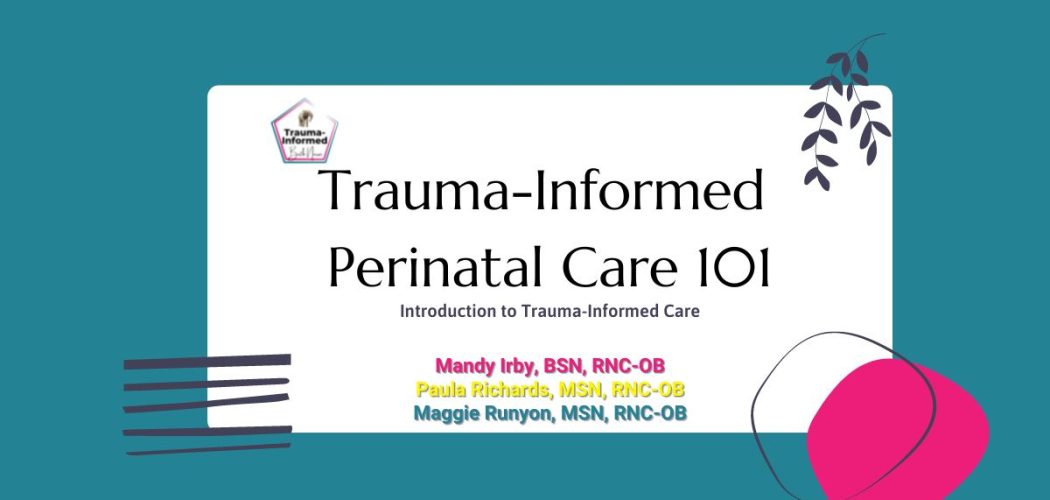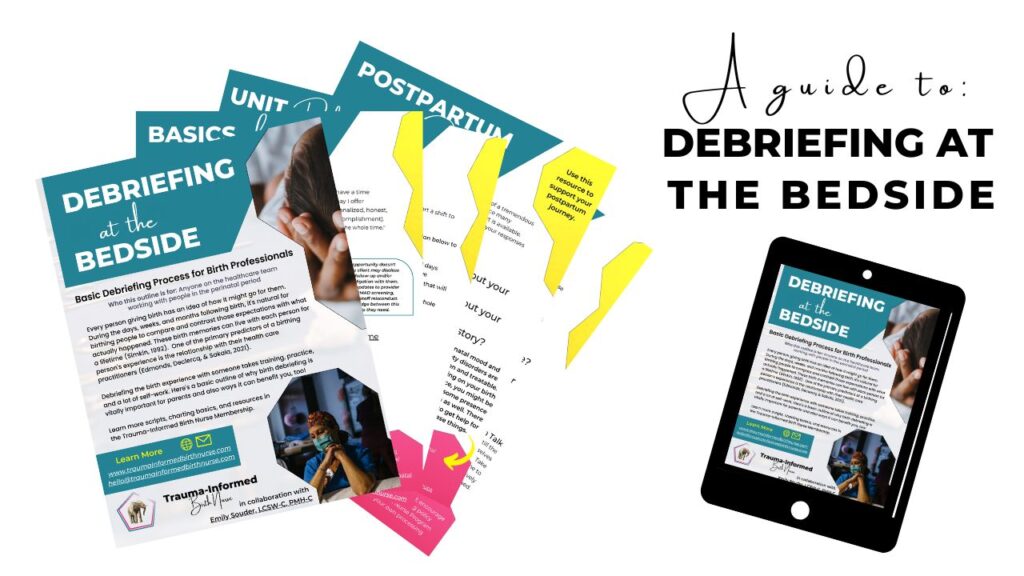Hi, I am Mandy Irby and I’m here with Maggie Runyan and Paula Richards.  And we are all three co-founders of the trauma informed birth nurse program, and we’re all bedside nurses in addition to other specialties, such as nurse educators, healthcare consultants, AWHONN educator, parent educators, entrepreneurs, lactation counselor, and nonprofit founders.
And we are all three co-founders of the trauma informed birth nurse program, and we’re all bedside nurses in addition to other specialties, such as nurse educators, healthcare consultants, AWHONN educator, parent educators, entrepreneurs, lactation counselor, and nonprofit founders.
And we were all three so overwhelmed and frustrated by feelings of isolation in making improvements to birth outcomes. We felt like we were swimming upstream, fighting uphill. These were almost universal sentiments when we looked outside of our own units among L and D nurses all over the US, however. We thought, 'there has to be a better way.'
Watch the video on Introduction to Trauma-Informed Care:
The curious perinatal nurses:
We are here for trauma informed- curious nurses. This introduction to trauma informed care will leave you with a solid understanding of what trauma informed care is and isn’t, and some actionable steps at the end that you can do immediately to move forward toward this model of care. Let’s start by reviewing some common myths around trauma informed care.
We as nurses can’t change collectively, unless we know we’re all going in the same direction together. Are you feeling curious, but not okay with one more fix? We did the fixes too. We did the learning, the communication training, the inter-professional collaborations, the committees. This is not one more fix. We know you’re feeling overwhelmed, confused by trauma buzzwords, perhaps you have zero capacity for more changes.
Also a lot of nurses are feeling, “I don’t have the power to make this big of a change. It runs deep systems deep.”
We deeply believe that nurses are uniquely positioned to make changes at the individual level, well within our scope of practice, that have ripple effects for generations forward and backward.

Now you’re curious, or you’re questioning my sanity, and perinatal care improvements need to be sustainable. Again, we know that your plate is full. This is our definition of trauma informed care.
What is trauma-informed care for perinatal nurses?
Trauma informed care is one element of organizational change that prioritizes the individual as the leader of their own health and recognizes how person-centered care shifts, unhealthy power dynamics to mitigate the potential for trauma found in each care interaction. When you hear that, how does that definition resonate with your own understanding of trauma informed care?
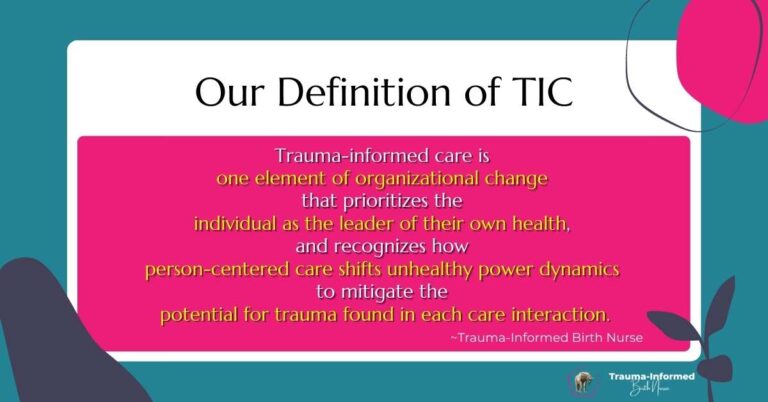
This is the definition from the Trauma-Informed Birth Nurse Program – the first and only trauma informed care training specifically for L&D nurses. Learn more about the TIBN Program here.
What is trauma?
A very simple definition of trauma: trauma is the response to a deeply distressing or disturbing event. There are big “T’s” and little “t” traumas. Essentially, trauma is something that overwhelms an individual’s ability to cope. It’s very individual, causes feelings of helplessness, diminish their sense of self and their ability to feel the full range of emotions and experiences. Think: loss of control, betrayal, abuse of power, helplessness, pain, confusion, and or loss.
And it’s important to remember that it’s about their subjective experience and us believing them. Now we may not know about everybody’s past trauma. And that’s fine.
We’re not here to diagnose nor categorize anybody’s trauma. (phew! That’s a relief!)
Nurses are patient advocates. Or are they?
As nurses, it’s not our job to diagnose, to understand everything about someone. But so often we have that pressure put on us. When we are over here in this helper nurse role, we either have been kind of pinpointed as the handmaiden, or the hero of the situation.
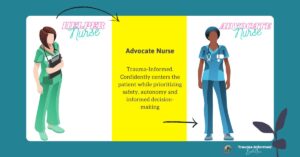
And, you know, both of those really take us away from truly connecting with our patients. Trauma informed care is a way for us to more confidently – step into that advocate nurse role, where we are centering our patients, prioritizing their safety, autonomy, and ensuring informed decision making. Of course these are our everyday goals. They can feel impossible when the priority is on centering the facility’s bottom line, however.
But so many times there are myths misconceptions about person-centered care and about trauma informed care, and we want to break some of those down for you.
Myths about trauma-informed care

So first is our awareness around it. Often we have been taught that trauma informed care is only for those people over there. Right? We think of folks who’ve experienced sexual assault, medical trauma like motor vehicle accident or hemorrhage, those who are in an intimate partner violence relationship, someone who’s lost their partner, or has lost a pregnancy, or anyone who discloses specifically that they have a history of trauma. They are the folks who need this type of specialized care.
However, the reality is, it’s so much easier than that. Trauma informed care is for every person, for every reason, for every birth. 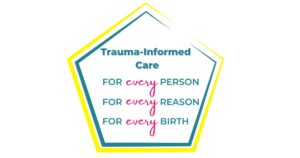 When we get away from that feeling of needing to diagnose and to dissect someone’s story and instead shift our standard of care to being one of trauma-informed care for each person, it’s actually so much easier for us.?
When we get away from that feeling of needing to diagnose and to dissect someone’s story and instead shift our standard of care to being one of trauma-informed care for each person, it’s actually so much easier for us.?
Challenging Colleagues
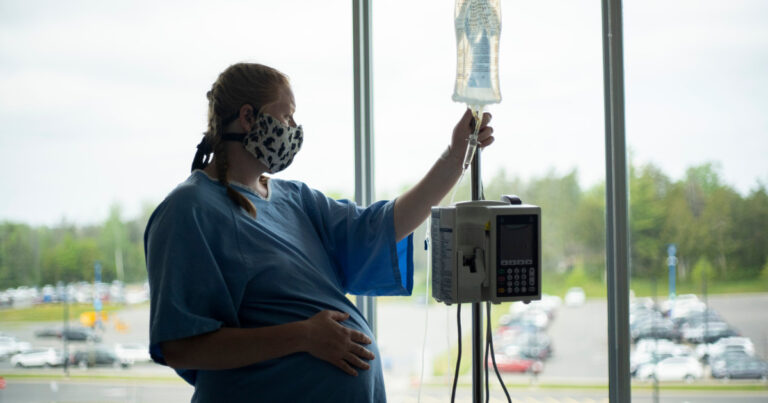
I know, but there are a couple challenging colleagues that you work with, and those are the ones that cause the trauma. I know who you’re talking about. We all have those people we work with. They might be the old-school providers who are stuck in the mud; the nurse ratchets of the unit. We also sometimes think that trauma is something that happened before the medical facility, so it’s not really anything that we can prevent or minimize.
Luckily, that’s not the truth. The painful reality is that 45% of birthing people identify their birth as traumatic, which means that way more of us play a role than we like to think in how folks experience their births.
Take a moment to integrate that information. It can be difficult to hear. However, it also means that we have so much power to step into as we work to provide better care.
Nurses have to detach

There’s another myth around trauma-informed care that you might be considering. Now you know that trauma is real, it affects a lot of our patients, but you’re detached and it doesn’t affect you.
And it’s your job to be a bit detached. Unfortunately, nurses who are affected by trauma are seen as weak, trauma only effects those who are unstable can’t handle the rigors of nursing, have mental health issues themselves, or perhaps people who had their own traumatic births or pregnancies that they’re carrying on into that space.
And we also know that right now, about 35% of birth nurses experience secondary trauma stress. So that means that about one in three of us are walking around carrying these heavy burdens from the births that we’re part of. We need this new standard that allows us to support our patients in the best way possible, and to also support our own wellbeing.
First, take imperfect action
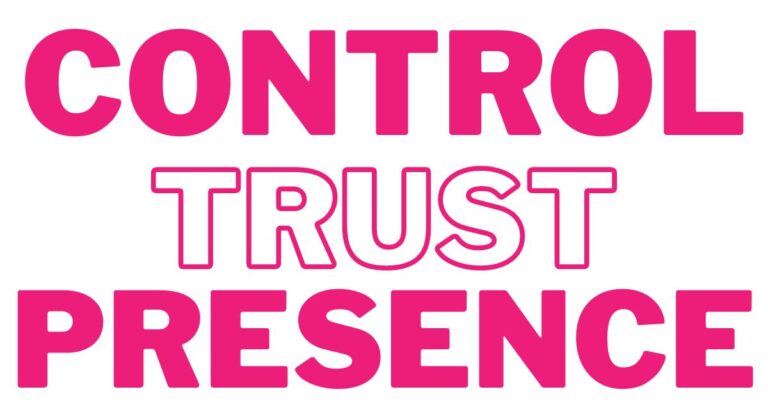
As promised we have actions that you can take immediately to start to shift into this new standard of care, even beginning in your next shift. And I want you to pause, these are things that you have at times done with your patients.
They may look simple, but I’ll explain imperfect action that is starting to try and implement these new actions, these interventions that may not feel new to you. And even if it’s imperfect, I think you’ll discover more about your patient. You’ll discover more about yourself! Perhaps you’re not doing any of these super consistently or perhaps you’re not doing some of these at all. So we’re also going to categorize some of them into ways that we can reduce the incidence of trauma or re-traumatization within our patient’s healthcare experience and relationship with us.
We’re trying to increase connection with them as a way to minimize their risk for trauma. We can group these by increasing control, trust and presence. So let’s take a look at some examples.
Trauma-informed care sounds difficult
The myth is that trauma-informed care is too hard. Is this just one more fix? How can I possibly know what everybody needs from me? How can I know all about their trauma? I’m tiptoeing around not hurting them anymore. Now that you have a little bit more understanding about trauma-informed care, I encourage you to consider changing your internal dialogue.
When we don’t understand why a patient is asking certain questions or refusing certain interventions, we’ll often try to explain what’s best for them. To us, this might feel like we’re educating them. Our patients, however, might take this as dismissive of their feelings or concerns, which fractures trust and fuels feelings of loss of control.
Instead of thinking, “what’s wrong with you?” consider getting curious, “what happened to them?” as a way to tune into ways that you can discover more connection with that person in control, trust, and presence.
Foundations of patient-centered nursing care often feel very aligned with what we believe to be best nursing practice. However, we’ve been taught that these actions and pillars of nursing care are nice to have and not need to have. These are not prioritized in our nursing culture, but we still attempt to incorporate these practices.
Take respect, for example. We always strive to be respectful to our patients. But are we taking a few seconds to center what respect means to them? Consider reaching out of your own culture, and get curious about what “respectful” looks like to them. Try asking what name they want go by instead of calling them by their first name or their last name, or even pet names or gendered salutations. Other ways to show respect consistently: share your name with them, allow them to see your badge, and ask before touching their body every single time.
This consistency is going to increase their sense of control and their trust with you improving their connection with you!
And again, informed consent in all ways: consider there might be times that you’re not including informed consent or informed choice in every interaction. How can you increase that frequency in your care interactions?
Simple and repetitive tasks that you might perform 100 times per shift are opportunities for strengthening trust with your patient, which can be protective against birth trauma. Instead of assuming that because they’re sitting in bed it’s a good time for vitals, ask before beginning. Mostly likely, your patient will agree that now is a good time, and they may even find the ask a bit silly. That one time that they were just about to get up to use the restroom and you ask before beginning, you’re showing your patient that their needs are priority. Remember, control, trust, and presence are not assumed; we have to consistently prove that we respect our patient’s needs, autonomy, and space.
In doing so, you’re physically centering the patient in their space, physically showing that you respect their space and continuously affirming that they are central and leaders in their own healthcare.
When it’s consistent, it’s affirming when it’s not, it’s confusing and degrades trust and connection with them.
In those cases, they might feel like they’re on the conveyor belt of healthcare. How dehumanizing – Yuck! Those are the times that as nurses, we feel like we’re the robots of healthcare. Yuck again! Remember, to reduce the risk for trauma, try increasing connection, control, trust, and presence.
There are so many barriers to trauma informed nursing care
We know from having countless conversations with nurses across the US, that trauma informed care sounds like a great idea, but we know it’s not that easy. You may be thinking that you have policies that limit care and make change really hard.
You also might be grappling with your own biases. As you’re thinking back about the kind of care you’ve been providing and whether it really meets the standard that you want to set for your care, you’re worried about getting push back, right? Your coworkers or your management, they just don’t get it. And it sounds good, but it’s not at all what you’ve learned before.
Or you’re feeling pretty low on the institutional hierarchy ladder. You’re feeling powerless to make change. And we understand this is not something that shifts in a day. Okay. This is reimagining our practice and re-centering ourselves on truly the art of nursing and where we started from.
So we want offer you more than what we know is this very quick overview. We wanna go deeper walk step-by-step through what it really means to
- uncover advocacy
- to listen to birthing people, to center parents in our education
- to investigate obstetrical mistreatment, the violence that occurs every day in our specialty
- to learn how to leverage our power and privilege as we step into this advocate nurse/patient advocate role
- to defend nursing practice – to work through a lot of the issues we have as we think about risk and liability
- and to live trauma aware both professionally with our patients, with our colleagues, but also as we carry this into our personal lives and we truly believe that community is central to that.
We want to offer peer support as you work to relearn, unlearn, consider what birth care can look like for you, for your community. And we do that through the trauma informed birth nurse program; we would love to learn and grow together as we work to improve birth outcomes, prevent trauma, heal ourselves.
Reach out on Instagram or comment below how you’re feeling in your nursing role right now and how we can help!
For more information on how to book a guest speaker or are interested in consulting on an obstetric quality improvement project, you can reach us here.
Click on the video below and share with a nurse colleague or educator 

